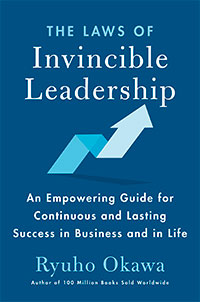Important Tips for HR: What to Ultimately Ask of Organizational Culture (Part 2)
World Teacher's Message No.290
What is necessary for leaders to ensure that both younger and older employees work together within the organization? Please advise on maintaining a fine balance between promoting based on seniority versus meritocracy.
Oct. 7, 2017 Happy Science Headquarters
For instance, people normally think that cars only run on the ground. However, auto makers like Toyota are researching and developing “flying cars”. In reality, it is still far from a practical application and it will probably cost around 2 million dollars to actually make a flying car.
A flying car appeared in the Batman movie, “The Dark Knight Rises” for example. It opens its door and flies out to the sky. If people can imagine that type of car is necessary, there is a possibility that such a car can be built. Although it may not sell if it costs about 2 million dollars but it may sell when the price goes down.
During Japan’s period of rapid economic growth, there was a tendency to promote people on the basis of their age. People who work at banks often ask you what year you joined a company and decide who is upper or lower. Besides, each of the section managers, deputy managers and chief directors have to meet with people from the other companies with the same title. As a result, a totally conglutinated seniority-based society was molded in Japan. However, such a seniority-based society started to crumble, and many people were subject to lay-offs in the 90’s.
It is okay to have that kind of seniority-based system when the society is stable. However, in the age of turbulence or the age of thorough innovation, it is important to decide who really has a young mind by looking at his/her taste, ideas, viewpoints or unexpected way of thinking.
For a person who is old in age but still very inspirational, it can be said that this person is “young”. On the other hand, to the type of the person who is young in age but has fixed ideas, is inflexible in thinking and cannot absorb new ideas, I just have to say he/she is already “old”. There might be a difference between actual, or physical age and mental, or entrepreneurial age. I think it’s important to realize this difference.
Kabuki’s Big Challenge in Business Judgment
This difference appears notably in the software industry. A person who can come up with new plans at any age can be considered that his mental age is “young”. On the other hand, a person who can’t come up with anything new, instructs the same way of doing and gets frustrated if others don’t follow his/her instruction — for example, an authority of Japanese flower arrangement who has practiced his or her same tradition for dozens of generations and insists the same way of cutting flowers — will become outdated and passe.
In the world of Kabuki, a traditional Japanese performing art, they had adopted the famous anime, “One Piece” to kabuki. I thought to myself, “they do this in Kabuki?” and felt like it was not suitable. However, it became very popular and many people went to see it. I guess you can call this an innovation.
In 2017, they incorporated an Indian sacred epic called “Mahabharata” into kabuki. They went to India to research and made special costumes there for the play.
Mahabharata is at least two thousand years old. It’s very old. I think it would be difficult to incorporate a foreign material into Kabuki. But it is true to say that even Kabuki needs innovations and new ideas to survive.
Then, Kabuki actors who are disguised as Buddhist Bodhisattva and Avalokiteshvara in golden and shiny costumes just like in ancient India appeared on the stage. Also, actors who are disguised as elephants and horses came up on the stage. They are trying to survive for sure by amusing people. They are always facing a fear of collapse in reality. This is like a win-lose situation.
They might lose their old fans by venturing new ideas, or they might hit a dead end unless they appeal to young people and gain new fans. This is a challenge in business judgment. They might lose old customers but obtain new ones. It’s a serious business judgment.
To Preserve the Tradition, or to Innovate to survive
It has already past more than 30 years since Happy Science was established, so we are older than the Rakuten Group, Inc. or the SoftBank Group Corp. Since both Rakuten and Softbank own a baseball team, people tend to think that they have been around for quite some time. But the fact is that we have been around a lot longer than they. I think Rakuten was started in 1997. Happy Science had already completed three Sohonzan temples (head temples) by then.
Rakuten started with approximately 4 salesmen and visited shops all around Japan, especially rural areas like Aomori prefecture, to tie up deals. Although I couldn’t figure out what Rakuten was all about at that time, this company has now grown to own a baseball team. So did Softbank. As the finance person I am, I won’t be surprised if they go under, judging from their management style. These companies, however, are popularly considered as big and stable financially, and this evaluation enabled them to own a baseball team.
There are many newcomers such as DeNA Group. I don’t know what these companies were really doing, when they were established, when they grew, or when they were acknowledged. I have no idea. I also scratch my head for what kind of business they do. I have never seen their company brochure. They didn’t exist when I was conducting a job search after graduation. But now these new companies own baseball teams as well. Before them, Daiei or other old companies used to own baseball teams. I should say that the generation is changing.
How can the organization survive when the current of time is changing?
Some organizations survive without innovating their traditional ways. Some are forced to be innovative and others are defeated by the new organizations.
After Happy Science had emerged, other well-established Japanese religious organizations were decreasing in the number of their believers and some were in the midst of restructuring. There is no other successful religious organization after Happy Science. It is a fierce battle in the world of religion in Japan. I think the key to survive in this battle is to what extent the culture of each religious organization can withstand innovations and new ideas.
The Reality of “Total Abolition of Nuclear Weapons” Is Not that Simple.
In this book, “What is Leadership of Virtue?”, the spirit of Liu Bei, founder of the Shu-Han dynasty, says on page 135 that a certain political party or religious organization released a big, full-page advertisement in the newspaper saying “A world with no nuclear weapon. Is it just a dream?” in Japan a few years ago (*). I’d like to dare them to ask if they would release the same ad when we are facing missiles from North Korea? (as of the day of the lecture).
Note (*1): Master Okawa maintains a state of mind in which he can receive messages from spirits and the heavenly world at all times — 24 hours a day, 365 days a year. For over 30 years, both guardian spirits of living people and spirits of past great figures have spoken through the voice of Master Okawa.
I saw in today’s newspaper that an organization called “ICAN” which is a Switzerland based group that leads a campaign for nuclear disarmament with actual atomic bomb victims involved, received the Novel Peace Prize. Switzerland is far away from Japan. I think it’s reasonable that some people in Hiroshima were pleased with the news. However, do you think Kim Jong-un would repent and say, “We were wrong”, “the Novel Peace Prize is the justice” and “If the Novel Peace Prize acknowledges the effort of nuclear disarmament, we are totally wrong, and I am sorry” ? No way! If he does, I will give him a round of applause. He will not listen and continues to develop nuclear weapons.
I would like to say to those people who simply advocate the total abolition of nuclear weapon, “Do you understand if other countries are not allowed to own nuclear weapons, that means those countries are destined to be subordinated by those with nuclear power?”
A forementioned political party probably didn’t imagine such a thing two years ago (in 2015). It’s also very clear that the current Novel Prize Committee cannot put themselves in the shoes of the Far East. For them, it is somebody else’s business. Of course, a world without nuclear weapons is an ideal, but the nuclear disarmament needs to be enforced to all countries including China who launched the “Confucius Peace Prize” against the Novel Peace Prize. I don’t think this political party understands the purpose of President Trump’s action (as of the day of the lecture).
A Person who can Advance Steadily Should Be the Leader
We are now witnessing the race of foresight, and the result will be clear in a few years or in the further future. If you lose the ability to think or generate new ideas, I think you are doomed.
Therefore, when you consider human resources in organization, especially when it comes to choosing leaders, highly knowledgeable people in terms of ideas and opinions need to be respected after all. Actual age should still be taken into account to some extent due to living accommodations. If an elder person only repeats the same thing, you need to consider that he/she has become inflexible in their thinking due to age and needs to go into retirement. I think, at the end, a person who can advance fast and steadily should be the leader.
In conclusion, if you can’t come up with new ideas and feel like you are stuck in one place and make no progress, then I think it is time for you to reexamine yourself. Of course, there are issues of organizational cultures and consensus, however when a real crisis occurs, nothing can be said and many things start to happen in the blink of an eye.




















